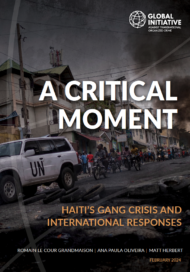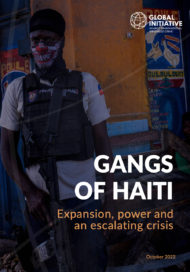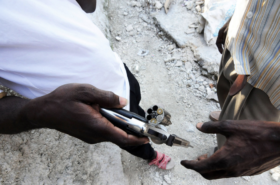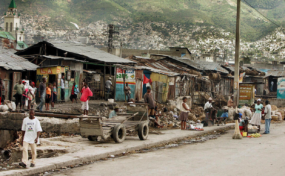Posted on 25 Mar 2024
Haiti has been plunged into an unprecedented crisis since gangs began attacking the capital, Port-au-Prince, on 29 February 2024. This has had dramatic humanitarian consequences and direct political repercussions. The country’s prime minister, Ariel Henry, resigned on 11 March, and the transitional presidential council, a body set up by the Caribbean Community (CARICOM) to fill the void, is still not operational.
The current crisis is part of an ongoing, alarming deterioration in the country’s security situation. According to the UN, the Haiti’s homicide rate in 2023 was 40.9 per 100 000 inhabitants, more than double the rate in 2022. Despite the central role played by gangs in Henry’s ousting and the levels of violence observed, the current crisis is not one of gangs seizing power. Rather, it is a case of gangs overthrowing the government, allegedly with the support of political and economic backers.
Far from being fully autonomous and a homogenous force, criminal groups in Haiti remain proxies and political tools. The crisis shows the prevalence of political–criminal relations in the exercise of power and the key role played by violent brokers. Against this backdrop, who will be able to regain political power and, more importantly, a semblance of legitimacy?
A devastating moment in Port-au-Prince
Since 29 February, gangs – under the banner of the Living Together coalition (Viv Ansamn, in Haitian Creole) – have escalated their siege of the capital, targeting strategic institutions. These include two prisons, one of them the central penitentiary, from which most of the inmates have escaped; a dozen police stations, which have been looted or destroyed; the international airport, which remains closed; and the main port terminal.
The humanitarian impact of these attacks is alarming. The city is under lockdown and more than 15 000 people have been displaced. Hunger and deteriorating sanitation conditions are being exacerbated by continued destruction and looting.
The evolving political economy of Haitian gangs
Between mid-2023 and the February attacks, the country’s gang ecosystem has evolved significantly. The G9 alliance and its leader, Jimmy Chérizier, had been losing momentum. While Chérizier first announced the creation of a ‘coalition of coalitions’ of gangs, Viv Ansamn, in September 2023, the subsequent murder of ‘Tyson’ – a key G9 leader – thwarted the project. With the death of Iscard Andrice in November 2023 – one of the brains behind the coalition – rival independent and G-Pep-affiliated groups gained power, and in the six months leading up to the attacks there was no sign of a gang alliance being formed.
Then, in December 2023, Haitian politician Guy Philippe resurfaced. Arrested in 2017 and extradited to the US for money laundering and drug trafficking, he was sentenced to nine years in prison. However, he was released early and deported back to Haiti on 30 November 2023. Philippe, who had founded a paramilitary group that helped overthrow the government of Jean-Bertrand Aristide in 2004, made a spectacular comeback on the political scene, organizing a series of demonstrations across the country.
Henry, who had pledged to step down by 7 February 2024, saw Philippe become his strongest opponent. On 7 February, however, Philippe’s promise of revolution collapsed. According to interviews by the Global Initiative Against Transnational Organized Crime (GI-TOC) in Port-au-Prince, Philippe allegedly failed to secure the support of key allies in the public, private and gang sectors. At the last moment, the forces essential to his project slipped away. Henry, who had the backing of the international community, seemed to be clinging to power by a thread.
The February attacks: a well-planned operation
At the end of February, Henry attended a CARICOM summit in Guyana, which focused on the Haitian crisis. Although Henry was seen as ‘part of the problem’ by a number of representatives, on 28 February, a CARICOM press release stated that he would de facto remain in power until elections were held in August 2025.
The next day, Port-au-Prince awoke in flames. That afternoon, while violence intensified in the city, Chérizier announced the formation of Viv Ansamn. The gangs had united under a single banner, opening an unprecedented, united front against the state.
The scale of the operations, launched simultaneously in several areas of the capital, required planning that could not have been done overnight. A video posted on social media by gang leader ‘Izo’ on 17 February may seem premonitory. Addressing Henry, he said that if Ariel was still in power, it was ‘not so much because he [was] a real leader, but only because [Izo] and the rest of the gang leaders [had not] made up their minds about it yet’. Furthermore, GI-TOC interviews in Port-au-Prince prior to the attacks reported the progressive movement of armed men towards the city centre, suggesting a massive attack, and media reports recently claimed that information about the invasion of the central prison on 3 March circulated well before it happened.
Violent brokers and a strategy of maximum pressure
Since then, Port-au-Prince has been under siege. But rather than all-out war, the gangs seem to be pursuing a strategy of maximum pressure, consisting of attacks interspersed with lulls. Rather than a decision taken solely by the gang leaders, our research suggests this may be the result of the relationships that still bind them to their political bosses, who could be setting (fluid) red lines without renouncing the use of violence for political ends.
Moreover, we should not be blinded by the apparent unity of the gangs. Viv Ansamn is a political truce – a strategic moment of cooperation in an ocean of inter-group mistrust. Contrary to what the alliance suggests, each group remains the master of its turf, and it would be naive to think of a lasting peace between the gangs.
Although the gangs’ financial autonomy has increased (through drug trafficking, extortion and kidnapping), this does not free them from political allegiances and negotiations. Far from behaving like insurgents, Haitian criminal groups are more interested in integrating or navigating the system than in overthrowing it. Indeed, the gangs’ activities are not merely parasitic: through violence, they have been able to position themselves in control of crucial commercial activities and extract profits from extortion that made them particularly powerful.
Violence, therefore, is still a tool, not an obstacle, to gaining or maintaining power. The crisis allows for the rise – or return – of key violent brokers. To establish oneself as a broker, a future political ally, or to remain in place as a ‘legal bandit’, one must appear reliable, indispensable and powerful.
A crucial time to support institutional efforts
Now that Henry has been removed from power, the transition has signalled the start of a new competition, with elections on the horizon. Port-au-Prince seems to be on two routes: the institutional track, embodied by the players rallying behind the transitional council, and the strategy of chaos. The balance of power between them is at its highest.
The inability to make the presidential transitional council operational bears witness to the conflicts running through the Haitian political arena, while each passing day consolidates the power of guns and of politico-criminal brokers. In this context, international sanctions – which have not been mentioned in recent international debates – could play a crucial role in destabilizing the links between the political and criminal worlds.
The absence of a clear international strategy only exacerbates the divisions in Haiti. The more the field is open to informal negotiations, opaque strategies and contradictory messages, the stronger the influence of those who wield violent power. Pending a more solid institutional structure, it is essential to give full legitimacy to the transitional council and the actors involved in a peaceful resolution to the crisis. There is an urgent need for trusting dialogue among and between Haitian actors, including civil society, and the international community. Without this, it is likely that the strategy of chaos will continue to prevail.



